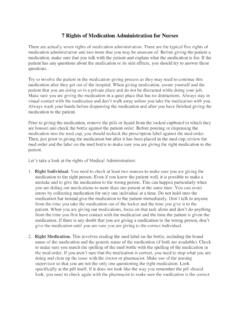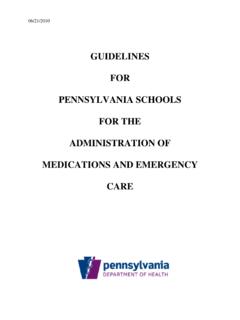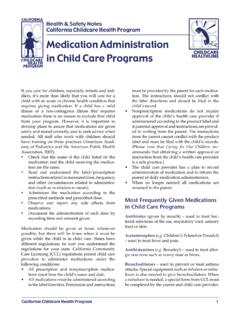Transcription of MEDICATION GUIDELINES FOR NURSES - NSCN
1 Revised April 2022, January 2022, December 2020, August 2020, first published as GUIDELINES for Licensed Practical NURSES in Nova Scotia: The Professional Practice Series MEDICATION administration 2019, 2013, MEDICATION GUIDELINES for Registered NURSES 2017, 2014, 2011 and MEDICATION Guideline for NURSES March 2020 Copyright Nova Scotia College of Nursing, Bedford Nova Scotia. Commercial or for-profit redistribution of this document in part or in whole is prohibited except with the written consent of NSCN. This document may be reproduced in part or in whole for personal or educational use without permission, provided that: Due diligence is exercised in ensuring the accuracy of the materials reproduced; NSCN is identified as the source; and The reproduction is not represented as an official version of the materials reproduced, nor as having been made in affiliation with, or with the endorsement of, NSCN Our practice support tools are developed using current reference material.
2 The source of this material is available upon GUIDELINES FOR NURSESThe Nova Scotia College of Nursing (NSCN) is the regulatory body for licensed practical NURSES (LPNs), registered NURSES (RNs) and nurse practitioners (NPs) in Nova Scotia. Our mandate is to protect the public by promoting the provision of safe, competent, ethical and compassionate nursing services by our registrants. The term nurse in this document refers to LPNs, RNs, and NPs unless otherwise of MEDICATION administration ..2 Principles of MEDICATION Management ..3 Principle 1: Authority ..3 Key Points: Authority ..5 Principle 2: Competence ..6 Key Points: Competence.
3 9 Principle 3: Education ..10 Key Points: Education ..12 Principle 4:Risks and Safety ..13 Key Points: Risk and Safety ..16 Principle 5: Collaboration ..17 Key Points: Collaboration ..18 Suggested Reading ..18 Appendix A - Decision Tree: Should I give this MEDICATION ? ..19 Appendix B - Federal and Provincial Legislation Related to MEDICATION administration ..20 Appendix C - Is the order clear, complete and appropriate? ..212 MEDICATION administration : the act of giving medications to an individual client through a specific MEDICATION route ( , enteral, percutaneous, parenteral). clientpractice environmentnurseRISK ASSESSMENTR egistered NURSES that have attained additional education and registration requirements to become a registered nurse authorized to prescribe (RN-AP) have the authorization to prescribe medications within their specific area of prescribing competence and practice.
4 The role of an RN Prescriber would not replace or duplicate services currently provided by nurse practitioners, but rather would complement these services and would allow health care providers to most appropriately treat the needs of the tool is a resource for NURSES in all practice settings to help them understand the principals associated with MEDICATION management. Like all regulatory tools, use this document in conjunction with employer policy, applicable legislation and the standards of practice and code of ethics for LPNs, RNs and NPs. Additional information is provided when guidance related to the scope of practice differs among LPNs and RNs.
5 Information specific to the role of NPs or RN Prescribers in prescribing MEDICATION is not discussed in this tool, except as it relates to providing guidance to RNs accepting MEDICATION orders written by NPs or RN Prescribers. Further information about the NP s accountabilities for prescribing medications can be found in the Nurse Practitioner Standards of Practice. Further information about the RN Prescribers accountabilities for prescribing medications can be found in the Standards of Practice for RN of MEDICATION administration NURSES are accountable to their clients to manage MEDICATION administration safely, competently, ethically and compassionately.
6 To fulfill this accountability, it is important that NURSES consider the following principles related to MEDICATION management:1. Authority2. Competence3. Education4. Risk and safety5. Collaboration Interwoven within these principles is the need for NURSES to consider the most appropriate care provider to administer medications to clients. Determining the most appropriate care provider requires NURSES to conduct a risk assessment. This assessment should involve the following considerations: Needs of the client - known vs unknown, if the plan of care is established, predictability or consistency of client response Supports in the practice environment -accessibility of practice supports including authorizing mechanisms such as policies, procedures and care directives Individual nurse - self-assessment of their individual competence, experience, ability to manage outcomes It is important for NURSES to recognize that these 3 things are interrelated and cannot be considered in isolation.
7 More information on the scope of practice and effective utilization of LPNs and RNs can be found in the Effective Utilization of RNs and LPNs Practice Guideline. See Appendix A for a decision tree to assist NURSES in determining if they should administer a MEDICATION . 3 There are no restrictions on the types of medications LPNs can administer. There are however, certain contexts and clinical situations where LPNs may not be authorized to administer MEDICATION via a specific high-risk route . Some routes of administration , such as an IV or IV push, have a higher degree of risk associated because the potential for untoward outcomes is greater.
8 High-risk is associated with a greater potential for unpredictability .Principles of MEDICATION ManagementPRINCIPLE 1: AUTHORITY A nurse s authority to administer MEDICATION is granted through legislation, regulation and policy. NURSES must be aware of and understand the scope of practice of the nursing profession, their individual scope of practice and their scope of employment. NURSES must comply with federal and provincial legislative requirements for MEDICATION and Provincial LegislationPrescribing, compounding, dispensing and administering medications are activities that are defined in both federal and provincial legislation for specified health professionals.
9 As members of an interprofessional collaborative team, NURSES should be aware of and understand the implications of relevant legislation, as well as the roles and responsibilities of each team member involved in the delivery of medications to of relevant legislation that impact MEDICATION administration can be found in Appendix NURSES require an order from an authorized prescriber for all medications in schedules I or II of the Drug Schedules Regulations made under Nova Scotia s Pharmacy PrescribersIn Nova Scotia, authorized prescribers include: NPs RN Prescriber Physicians Midwives Dentists Optometrists PharmacistsThe type of MEDICATION that individual authorized prescribers can prescribe varies depending on their professional designation, the schedule(s) of drugs they are authorized to prescribe and their scope of practice.
10 Prescribers are accountable to know which medications they are authorized to prescribe. Types of Authorizing Mechanisms MEDICATION OrderA MEDICATION order is the direction provided by an authorized prescriber for a specific MEDICATION to be administered to a specific client. MEDICATION orders may be received in writing or electronically or delivered verbally in-person or by telephone. Acceptable forms of MEDICATION orders include: Prescriptions Orders in the client record Care directives Pre-printed orders Copy of a pharmacy telephone orderPRINCIPLE 1: AUTHORITYN urses are authorized to take MEDICATION orders from nurse practitioners and RN Prescribers.






